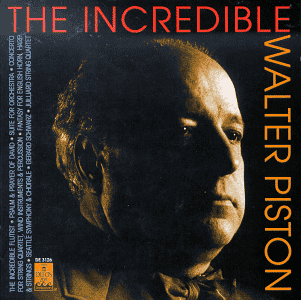WALTER PISTON
Incredible Flutist suite (1938) 17.50
Fantasy for English horn. harp and strings (1954) 8.28
Suite for Orchestra (1929) 14.23
Concerto for String Quartet, wind instruments and percussion (1976)
9.57
Psalm and Prayer of David (1959) 17.09
 Juilliard String Quartet (in
the Concerto)
Juilliard String Quartet (in
the Concerto)
Seattle SO and Chorale/Gerard Schwarz
 rec 1991/92 DELOS DE 3126
[68.09]
rec 1991/92 DELOS DE 3126
[68.09]
Amazon
UK
Amazon
US

The Incredible Flutist is a score crowded with incident. These encompass
a jazzy stomp, Arabian woodwind filigree, auto-klaxon barks from the brass
(Arrival of the Circus), a coaxed expansive lyricism to the point
of sentimentality (Tango), a mercifully brief brash march, an equally
unsubtle Polka, an easeful hymn to high noon (The Flutist),
and a sequence of popular dances (a la Barber's Souvenirs). These
sum up the variety of Piston's landmark score. The Incredible Flutist
suite is presented with a love that is patent and affecting. A lovely
performance and recording.
The overture-size Fantasy for English Horn (similar duration to the
Concerto) was premiered at Boston by Munch and is of a Gallic sensibility
roving into the 'art nouveau' world of Charles Griffes in his White
Peacock.
Next come Piston's first and last works for orchestra. The three movement
Suite is rife with crowded action - a cubist approximation of the hustle
and bustle of Piston's milieu in the bars and hotels of Boston; an unwitting
counterpart to Weill and Eisler's Germany. But this is not the end of the
story for the andante sings of rest and regeneration both in the English
Horn solo and in its orchestal material. The classically fugal finale is
rife with darting antiphonal effects.
The String Quartet Concerto is most warmly recorded and performed but its
gentle dissonances and distorted world do not hold immediate attractions.
The work was written for the Portland Quartet whose interpretation of the
composer's 4th quartet impressed him so much.
The Psalm and Prayer is Piston's only religious work. Piston had no
religious faith and even banned Christmas decorations from the home. However
rather like the similarly-inclined Vaughan Williams this was no obstacle
to a successful and sincere setting of Psalms 96 and 86. The sound of the
choir recalls Howard Hanson's Eastman Choir for his Mercury recording of
Lament of Beowulf.
The notes (in English only) are helpful although they omit the words of the
two Psalms.
Rob Barnett

